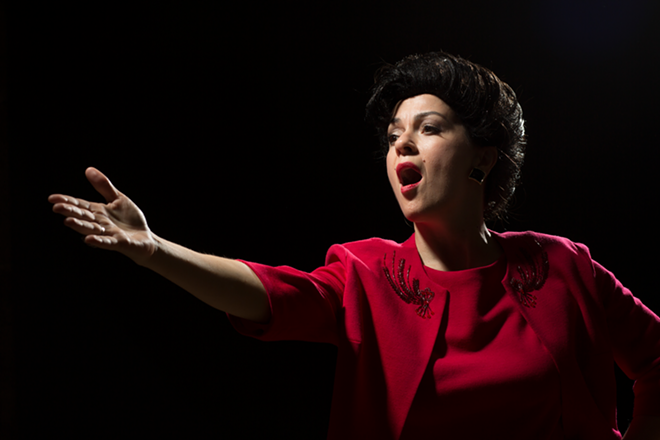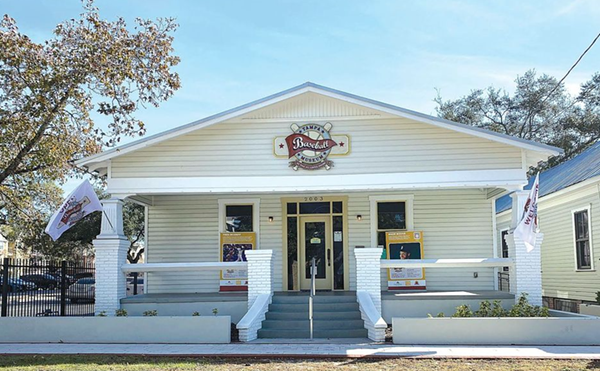Why are we fascinated by the screw-ups of celebrities? Revenge, I think, is part of it. If movie, music, and theater stars insist on having fabulous lives, our jealousy won’t be assuaged till they’ve flamed out big time, preferably in ways that are vastly embarrassing. This is what sells National Enquirers and their ilk, and takes pleasure in every sordid detail of that couple’s hostile breakup, this singer’s drug overdose, that film star’s explicit sex tape, that icon’s banishment to rehab. To find that Mr. and Ms. Thing actually lead a fairly decent private life is OK as far as it goes; to learn that they’ve been arrested for transporting huge quantities of crystal meth in the underwear of sex slaves is more to the point — and strangely gratifying. So it’s not all so wonderful, up there in the glitter. Hey, if even Brangelina can’t keep it together, how bad can our own lives be?
It’s this obsession with superstar nosedives that’s summoned, not so subtly, by End of the Rainbow, Peter Quilter’s interesting play-with-songs about the last days of Judy Garland, currently appearing in a fine freeFall Theatre production. Showing us Garland as a drunk and prescription drug addict, displaying her foul language, romantic brawls, and prima donna tantrums, Rainbow feeds on our most voyeuristic impulses at the same time that it thrills us with Melissa Minyard’s spectacular renditions of “Come Rain or Come Shine,” “The Man that Got Away,” and “Somewhere Over the Rainbow.” In fact, that’s Rainbow’s contract: It’ll give us the best and the worst of Judy Garland, and as for real insight or deeper significance, well, that’s for some shrink somewhere. Because Quilter’s dialogue is often clever, because the performances of Minyard and her three fellow actors are topnotch, Rainbow almost allows us to ignore the fact that we’re experiencing a narrative that, in the hands of a more searching writer, might have told us something substantial about Garland, Hollywood, or our own prurient interest. But no, here there’s dish and dazzle and nothing in between. It’s as magnetic as that latest People Magazine tell-all, and it’s got great singing.
We’re in Garland’s London hotel room (elegantly designed by Matt Davis) at the start of a six-week gig at the Talk of the Town. Garland is played by the talented Minyard as a drama queen who’s quick to make her crises everyone’s problem, and who’s utterly comfortable with being more important than anyone she knows. Accompanying her is her fiancé Mickey, played by Robert Teasdale, as a strong man whose only weakness is his adoration of Garland, and who can either refuse her her favorite pharmaceuticals, or offer them up, depending on the emergency. With them also is pianist Anthony, played by Michael Ursua as a decent gay man whose love for Garland might save her if she weren’t so dedicated to her self-destructive spiral. Over two acts, we watch Garland fight and make up with Mickey and Anthony, participate in a scattered, humiliating radio interview (Daniel Schwab is the BBC interviewer), demand alcohol, steal pills, try to run out on a London audience, and remember — all too briefly — how Hollywood never failed to shove stimulants and downers in her face in order to get her through a day. She’s vulgar, demanding, self-pitying, loud. She’s selfish as can be.
And she sings — or rather, Minyard belts out songs in her guise to wonderful effect. There are only 10 songs in the course of the performance, but I could have enjoyed another dozen, especially when offered by this wonderful voice. So yes, there’s “Just in Time,” “You Made Me Love You,” “The Trolley Song” and more, and at certain moments Ursua is accompanied by five other talented musicians who make a terrific contribution to the full, stimulating sound. There are also projections on one wall, showing a busy street in London, or portraits of the real Garland, and there are Frank Chavez’s persuasively upscale costumes. Eric Davis’s direction is muscular and straightforward. The play takes place in 1968, but has the feel instead of those Broadway dramas of the ’50s, in which everyone was wealthy and drank martinis.
The ending is abrupt — suddenly Act Two is interrupted, and we’re told how Garland, 47, died of an overdose of Seconal back in the States. I wish I could claim that I understood, when I left the theater, something I hadn’t when I walked in. But this isn’t that sort of play: It’s tabloid journalism, not detective work, about the fire, not the arsonist. Clearly, there’s much more that needs saying about Garland and what forces really killed her. I wish Rainbow had said it.

















